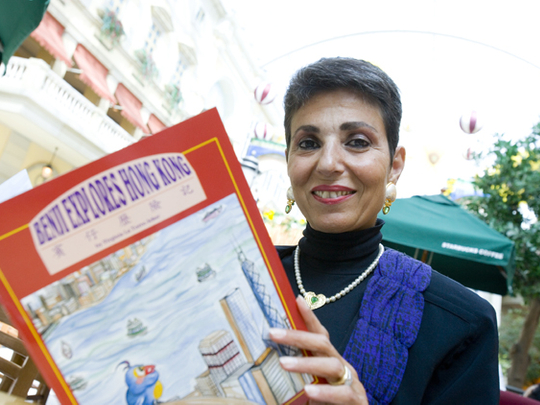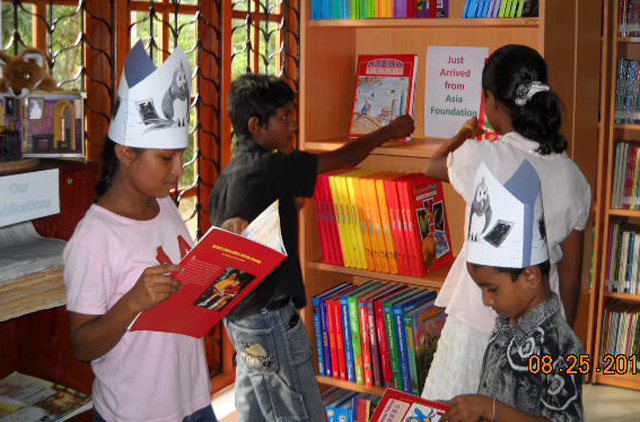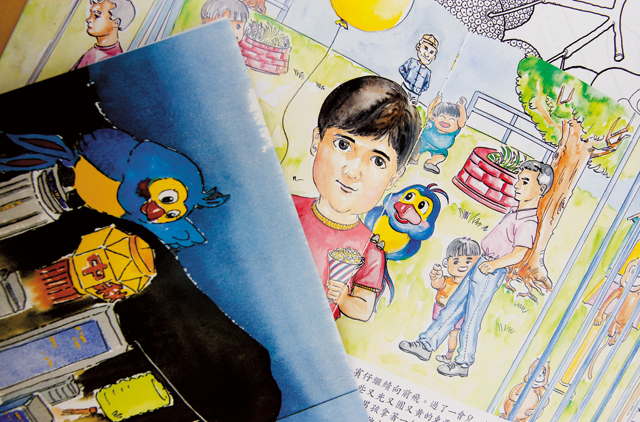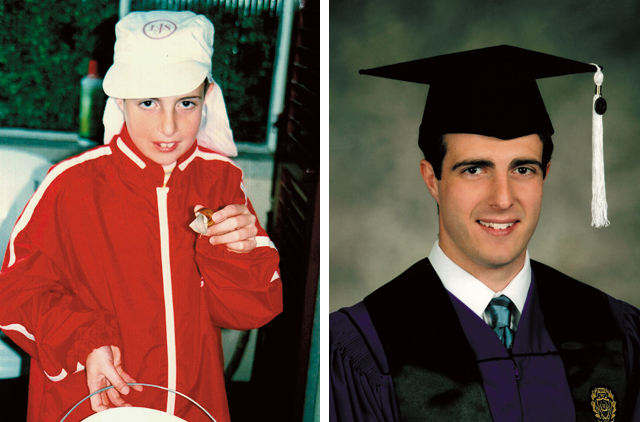
I find out later that she is indeed two people: a successful lawyer specialising in American law, and a children's author who is concerned about underprivileged children across the globe not having enough books to read.
Writing a new chapter
She is as concerned about a lack of reading material for underprivileged children as she is about her next brief. In fact, it was this concern that led her to pen her first book, Benji Explores Hong Kong in 1991.
"We moved to Hong Kong in 1986 and my son Marc was born there in 1988," she says. "He loved storybooks. And I am a big believer that children should read as many books as possible. I know we have computers today, but to my mind, they don't compare to books that you can touch, books that you can sit with a parent or friend and actually look at pictures and read together, have a hug while you are sitting on the bed reading. These are things I don't think you can enjoy while reading on a computer."
Being a new mother, and comparatively new to Hong Kong, Jeker looked for books about Hong Kong to satisfy young Marc's curiosity. She found there were hardly any that a child could read and understand. So, she decided to write one herself.
"I decided to put together for my son a book that was special and about Hong Kong," she says. "I wrote my own story for him, with my own paintings and watercolour illustrations."
The story was about a little bird, Benji, and his adventures in Hong Kong with a boy called - you guessed it, Marc. The reason for choosing a bird as a protagonist was twofold. "The Chinese love birds, and I wanted something with as much character about Hong Kong as possible, so the main character became a bird."
Also since Benji was a bird it could fly around Hong Kong. It made it easier for Jeker to write about different locations without having to devise reasons to write about them. "The beauty of making Benji a bird was we could explore through his flights all the places I had taken my son to see [in Hong Kong]."
In the book, Benji was a bird bought by a newspaper vendor to give him company at work. "This is very common in Hong Kong - newspaper vendors work outside and often hang out their birds in cages by their stand," explains Jeker. "The Chinese really love their birds - I've even seen construction workers take their birds to their worksite."
Benji's Chinese owner however is so busy that he often forgets to feed him. But he has a good heart, and so allows him to explore the world, after tying a big yellow balloon to the cage.
"I'm going to let you out, you can explore as much as you want, and when you want to return home look for the big yellow balloon tied to your cage," he tells his bird.
So, the bird goes on his happy explorations but... loses his way. Flying above the popular botanical gardens in Hong Kong, he spies a big yellow balloon, and swoops down thinking it's his home. At the end of the balloon's thread however is little Marc who's on an outing, enjoying the big yellow balloon he's holding. When Benji sits on the balloon, little Marc is thrilled. He has found a new friend and Benji a new home.
Benji and Marc become the best of friends and continue their explorations together.
"It had to have a happy ending," says Jeker. "The bird didn't have a great owner, but he got a better owner; so the message was you have to learn to be responsible for your pets. It also covered all of Hong Kong, so that's fantastic for a child."
Finding a market
Not only Marc, but Jeker's friends who read the book loved it. "The book was very popular with my friends, and all of them encouraged me to get it published," says Jeker. "So after a year, I did try and get it published which was a very long and arduous process."
To cut a long story short, Jeker faced numerous rejections. A niche Chinese publisher made an offer, but "the terms of the deal were terrible, so I did not accept it," she says. "They not only wanted me to contribute to the cost of publishing the book, they also wanted complete control over the story and the artist's work, so it wouldn't be my story at the end of the day, maybe. I didn't want that risk. So we decided that self-publication was the way forward for us."
At that time Jeker was also working as an attorney, a US tax specialist, so time was at a premium.
"It was a major project to take on, but I did and it ended up being one of the most enjoyable projects we have had as a family. It was fabulous!"
Jeker learned the ropes of marketing and distribution first-hand. "We went to the newspapers before we actually printed the book to see if they were interested in writing about the effort," says Jeker. "They were all interested, so we went to prominent bookstores and told them the newspapers would run a story on our effort and we'd like to list their shop as the place where the book was available.
So the bookstores were happy to stock it. Everybody was anxious for the book to be published and we did it with the help of friends, and their friends - translators, layout, design, printers - pooling all our resources."
Jeker's effort was in the newspapers and on the radio, so the books became very popular very quickly. The initial print order of 2,500 went off the shelves so fast that a reprint of 5,000 copies was ordered.
Reaping success
The success of the first book encouraged Jeker to write a sequel.
"I did a second book that grew with Marc. This time we covered the culture of the Chinese festivals celebrated in Hong Kong."
This time the initial print order for Benji Learns About Chinese Festivals in 1992 was 5,000 copies. This one was again very popular and sold very well. "There were no books for kids at the time on any of this subjects," says Jeker, analysing their success.
"I did quite a bit of research on this, and also received a lot of support from the newspapers."
She did a final book, Benji Sees Asia the same year to round off the series. This book was different in that Jeker concentrated on other countries. "It's a book with which kids can learn the alphabet with things that are Asian. Every letter stands for something Asian and the entire text rhymes, from start to finish. Oh, this is my most creative work - the whole thing rhymes, it's so cute! The kids just love that, even if they don't know what it all means."
With that ended a very creative chapter in Jeker's life. But books have a way of taking a life of their own. The Benji books, although only 17,000-odd were printed, remain popular in many parts of the world. "The books are still very popular, I've seen them trading on eBay, on different websites, out of print books websites, and I know that they are really being read all over the world," says Jeker in wonderment.
Fact or fiction?
An interesting incident brought home that fact. Marc, the child in the Benji books, has now just completed university in the US. "When he was just a freshman, he met a girl at the university, a Eurasian lady," tells Jeker. "Her dad is from Boston and her mom from Hong Kong. When they started to talk, she asked Mark if he'd ever been to Hong Kong. She'd been there only twice. But she seemed to knew a lot about Hong Kong, many of its popular locations.
"My son told her, ‘You know so much about Hong Kong, but you've been there only twice, it's amazing that you've been to so many places.' She replied, ‘Well, when I was little my mom bought me a book about a bird who flew all over Hong Kong.' My son almost fell down in surprise! He asked her, ‘Do you remember the boy Marc in the story who meets up with the bird in the botanical garden? That's me!" She called her mom and told her, "Mom, you're not going to believe this, Marc, the kid in the Benji books, is here!" She said it had been her favourite book as a kid. A few weeks later, her parents went to visit, and her mother brought the book to show our son. I met this girl later."
Jeker was happy to know that her books had gone beyond the domain they were meant to. But all good things come to an end, and she thought Benji had had his last flight. Until she came across an email from a friend.
Finding a new meaning
"A friend's daughter used to do a lot of work with charities. One of the charities she worked for in the US was Books for Asia. It is a foundation that focuses on getting books to children who never have a chance to own a book, or schools that don't have resources to buy their own."
Books for Asia tries to get books for underprivileged children from bookstores, publishers, and people who want to donate. "My friend sent me an email with a link to Books for Asia that asked people to vote for a title from among their list which they thought was the best for children. The publisher of the one that got the most votes would donate a certain number of those titles to Books for Asia to be distributed among underprivileged children in schools across Asia. I thought it was a fantastic idea. It gave me the idea to donate the Benji books I had with me."
She had a little more than 2,000 books that she had brought with her when she and her husband moved to Dubai. "I couldn't just leave them because the bookstores couldn't take so much stock on - rental space is very expensive in Hong Kong."
Now she is happy she brought them with her. "I contacted the director of Books for Asia, and she was thrilled with my offer to donate the rest of the Benji books," says Jeker. "A final adventure for Benji and I'm so happy it can be in Asia!"
Benji goes to Sri LankaThat's how Benji's last adventure to Sri Lanka began. But that again was just the beginning. The problem arose in transporting the books to Sri Lanka, where Books for Asia decided they were required. Freight charges were prohibitory, but the famous Jeker tenacity came to the fore in finding a way out.
"The stumbling block was to ship these books from Dubai to Sri Lanka," says Jeker. "There were other choices too: Mongolia, Bangkok, in fact all over Asia. But Sri Lanka it was, so we approached some carriers to help us out. It meant a lot of time spent chasing people. But I didn't give up, though many people would have coming up against the wall. Despite my busy schedule I kept at it."
Finally, freighters Frico International LLC agreed to ship the books to Sri Lanka free of charge. "The managing director, Mr Gamini Kannangara, is a Sri Lankan national. His assistant, Mr Indika Perera, was a great help, and has done a lot of work getting this to really happen. He also got the MD's approval to ship them for free."
The books were duly shipped to Sri Lanka and were received by Books for Asia on August 16. Books for Asia official Sharmini Nagendran wrote to Jeker about the rousing welcome the books had from schoolchildren: "Greetings from Books for Asia Sri Lanka! We are delighted to tell you that the Benji books have already been donated to libraries including, public libraries, orphanages, mobile libraries, community libraries, etc. The children are thrilled!"
Fulfilment has no price
The three books that Jeker published cost an estimated $15,000 to $20,000. They did eventually turn in a profit, "but if looked at in terms of time spent from my work as an attorney, it was a monetary loss. Every time I tell my husband that we earned a profit on the Benji books, he laughs and says, ‘Honey, think of all the time you spent!' I charge by the hour so you can guess how much I lost."
But it earned her a lot more than money. "We earned - if you want to use that word - many things that you couldn't put a price tag on," says Jeker. "After the publication I went to lot of schools in Hong Kong and spoke to the children about what it is to be an author. It takes a while to write a story, starting with your idea, bringing it through all the way to the end until it's published and sold. The kids were fascinated.
Some of the schools really got involved and they organised Benji contests among children. One of them was to make the kids write a story - another adventure for Benji.
Spreading the good word
The biggest accolade however came here in Dubai when after reading a report on the books being donated to Sri Lankan children, a little girl, Amani Hussaini, was inspired to write and illustrate a story of her own. "Her parents, Aisha and Ricky, are very philanthropic and have done a lot of great things in the UAE for children in need," says Jeker. "They are hoping to publish the little girl's book and use the sales proceeds for charity for children. I am hopeful this can work out. More importantly, it is a great story of a UAE youngster making a difference. It will take on a life of its own - a great story of giving and it was done by a five-year-old author living in Dubai!"
Meanwhile, Jeker is just thrilled that Benji had his final adventure. "I am really glad that I didn't give up," she says. "Because many a times you get frustrated. Doing the books, I really wanted to give up so many times because it took me a year to get the books published, and a year is a long time. There's a lesson there for the kids of today - you've to to be patient. If it doesn't happen instantly it doesn't mean that it's not going to happen."
The icing on the cake would be if her story inspires others to donate books for underprivileged children, says Jeker. "I hope bookstores or publishers in the UAE, the Middle East, are inspired by this article to send books for poor children in Asia who have never had a chance to own a book."
Books for Asia
The Asia Foundation, of which Books for Asia is a part of, is a non-profit NGO that supports initiatives to ‘improve governance, law, and civil society; women's empowerment; economic reform and development; sustainable development and the environment; and international relations'. It has 18 offices throughout Asia, an office in Washington DC, and is headquartered in San Francisco. Books for Asia puts one million new books into the hands of students and teachers in 18 countries every year. In 2009, the foundation distributed books and journals valued at over $43 million.
The foundation accepts donations of books from well-known publishers, who donate their overstock and cash donations to increase the number of books reaching areas affected by poverty and natural disaster.
It also encourages individuals and institutions to conduct book drives. Teachers, students, employee groups, service clubs and concerned individuals can organise book drives as a fun way to share the love of books with those who need them most.
http://asiafoundation.org/program/overview/books-for-asia
Amani's promise
"lhjysh7qjtcaj4sik5 rlueurd;akuanuw6fjkehfd ksms,fbmsjdgrltrergt". This was the message Amani Hussaini typed for her Virginia aunty after hearing that she was sending the Benji books to poor schoolchildren in Sri Lanka.
Her mother Aisha Hussaini says, "She typed the message herself as she didn't want mummy to help - she is a big girl now almost getting to five this month!
"I am sure Benji will understand the message but below is a version that adults can read:
"Aunt Virginia presented me the wonderful books when I was a baby and my mum read the stories out to me. I love Benji and Marc and I am writing a short story during my summer holidays and for my birthday present this year my mum has promised to print it just like the Benji books. And then like Aunt Virginia I will send my books to children in India and Africa to make them happy. Thank you, Aunt Virginia, for giving us ‘Benji'. Lots of love, Amani.''














